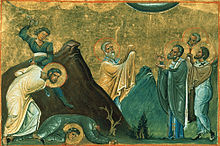
The seventy disciples or seventy-two disciples, known in the Eastern Christian traditions as the seventy apostles or seventy-twoapostles, were early emissaries of Jesus mentioned in the Gospel of Luke. The correct Greek terminology is evdomikonta (εβδομήκοντα) apostoli or evdomikonta mathetes.

June 20 - Eastern Orthodox Church calendar - June 22
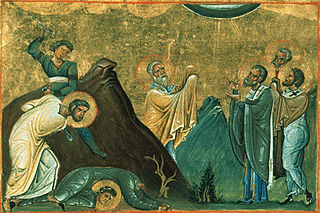
Quartus was an early Christian who is mentioned in the Bible.

Ampliatus, was a Roman Christian mentioned by Paul in one of his letters, where he says, "Greet Ampliatus, whom I love in the Lord." He is considered one of the Seventy Disciples by the Eastern Orthodox Church. Tradition has it that he and his companions subsequently attached themselves to the Apostle Saint Andrew, and ultimately died martyrs.

Olympas was a Roman Christian whom Paul of Tarsus saluted in around 65 AD.

Erastus of Corinth, also known as Erastus of Paneas, held the political office of steward, in Corinth, according to the Epistle to the Romans 16:23 of the New Testament. The office is defined as "the manager of household or of household affairs" or, in this context, "treasurer". The King James Version uses the translation "chamberlain", while the New International Version uses "director of public works". A person named Erastus mentioned in 2 Timothy 4:20 and Acts 19:22 is often taken to be the same person.

Urban of Macedonia is numbered among the Seventy Apostles. Along with the Apostles Ampliatus, Stachys, Narcissus of Athens, Apelles of Heraklion and Aristobulus of Britannia he assisted Saint Andrew. St. Andrew ordained Urban bishop in Macedonia. He died a martyr, and his feast day is October 31.
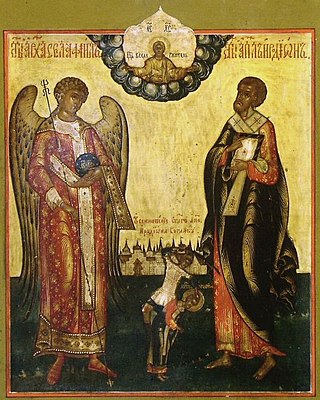
Herodion of Patras was a relative of Saint Paul whom Paul greets in Romans 16:11. According to tradition, he was numbered among the Seventy Disciples and became bishop of Patras, where he suffered greatly. After beating, stoning, and stabbing him, they left him for dead, but St. Herodion arose and continued to serve the Apostles.

Rufus of Thebes is numbered among the Seventy Disciples in Eastern Orthodox tradition. He was bishop of Thebes in Greece, and according to some traditions is referenced in Romans 16:13. His feast day is April 8. However according to Easton's Bible Dictionary the Rufus in Romans 16 could well have been the Rufus mentioned in Mark.

Asyncritus of Hyrcania, also Asynkritos, was numbered among the Seventy Disciples. He was bishop of Hyrcania in Asia. Saint Paul mentions him in his letter to the Romans. The Church remembers St. Asyncritus on April 8.
Phlegon of Marathon is numbered among the Seventy Disciples. He was bishop of Marathon in Thrace. He is referenced in Romans 16:14, and his feast day is on April 8.
Hermes of Dalmatia is numbered among the Seventy Disciples. He was bishop in Dalmatia.

Philologus of Sinope is numbered among the Seventy Disciples, and is commemorated with them on January 4. He is also commemorated on November 5 together with Ss. Patrobas, Hermas, Linus, and Gaius.
Jason of Thessalonica was a Jewish convert and early Christian believer mentioned in the New Testament in Acts 17:5–9 and Romans 16:21.

According to the New Testament book of Romans, Tertius of Iconium acted as an amanuensis for Paul the Apostle, writing down his Epistle to the Romans. He is numbered among the Seventy Disciples in a list pseudonymously attributed to Hippolytus of Rome, which is found in the margin of several ancient manuscripts.
Carpus of Beroea of the Seventy Disciples is commemorated by the Church on May 26 with Alphaeus, and on January 4 with the Seventy.
Fortunatus is person mentioned by St Paul in I Corinthians 16:17: I was glad when Stephanas, Fortunatus, and Achaicus arrived, because they have supplied what was lacking from you.
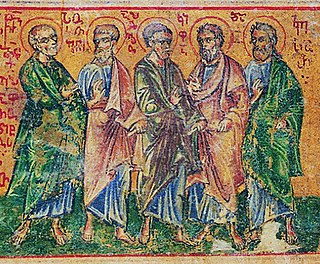
Cephas of Iconium is numbered among the Seventy Disciples, and was bishop of Iconium or Colophon, Pamphylia. The name "Cephas" is Aramaic for "Peter."

November 9 - Eastern Orthodox liturgical calendar - November 11
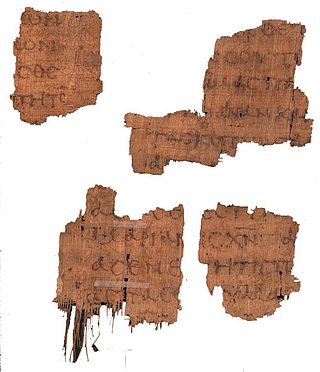
Romans 16 is the sixteenth chapter of the Epistle to the Romans in the New Testament of the Christian Bible. It is authored by Paul the Apostle, while Paul was in Corinth in the mid-50s AD, with the help of a secretary (amanuensis), Tertius, who adds his own greeting in Romans 16:22. Chapter 16 contains Paul's personal recommendation, personal greetings, final admonition, grace, greetings from companions, identification of writer/amanuensis and blessing. The chapter is divided into 27 verses.
